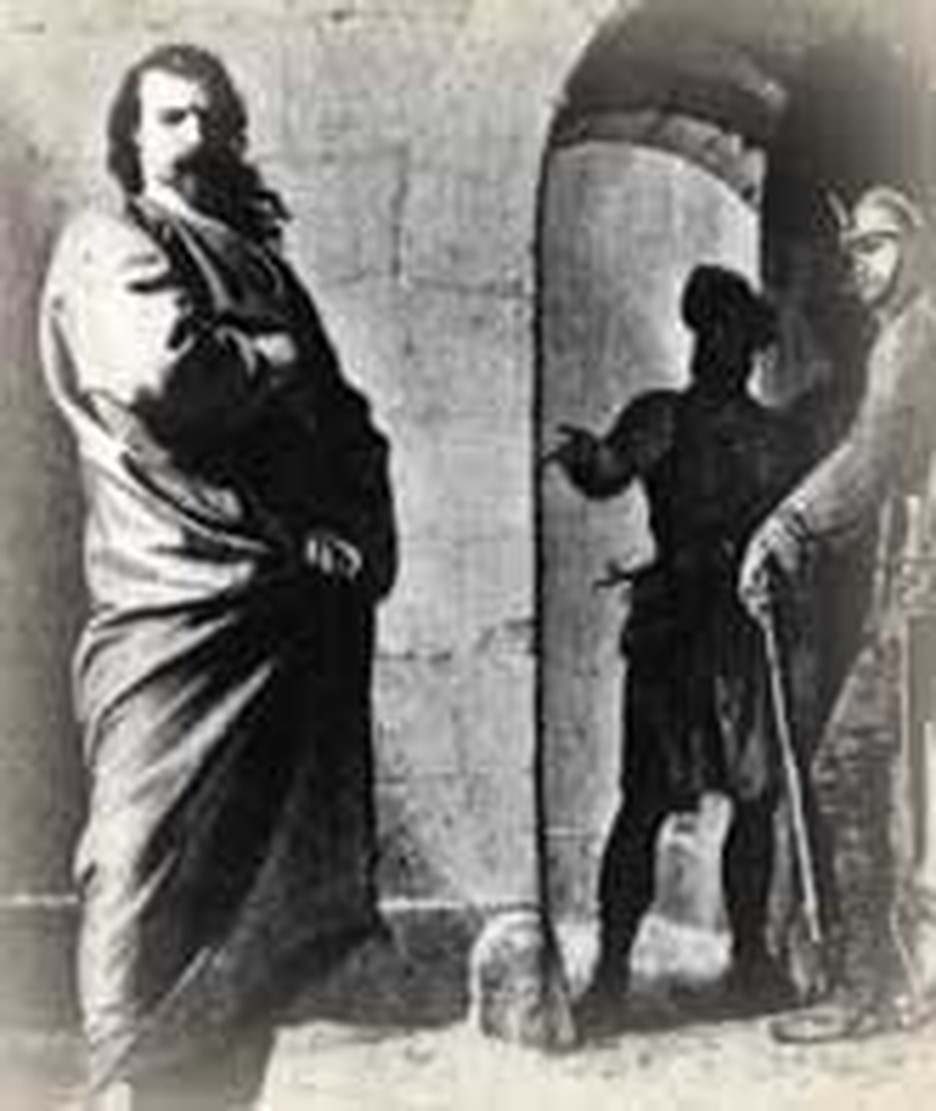
In a close boxing bout, first one boxer is on the ropes and then the other. Neither can deliver a knock-out punch. Round after round, the match remains in doubt. The struggle between Henry IV, Holy Roman Emperor, and Pope Gregory VII was like that.
Henry inherited his throne in 1065 when he was only fifteen. From the first, he faced rebellion in Saxony. In 1073, the Saxons destroyed several churches. Henry accused them of sacrilege, and Gregory VII (Hildebrand), the new pope, who wanted to remain on good terms with Henry, condemned them. End of round one. Give it to King Henry.
The emperors had required the church to obtain imperial consent before confirming a pope. Hildebrand did not seek the usual approval and Henry was too weak to insist. By petitioning the pope to condemn the Saxons, Henry effectively admitted that his consent was not needed to make a pope. Round two, Pope Hildebrand.
The Saxons offered to make reparations for the churches and castles they had destroyed, but in 1075 Henry defeated them in a surprise attack. He imprisoned many nobles and some bishops and installed his own bishops. Round three, King Henry.
With bishops in prison and Henry selling bishoprics to new bishops and investing them with the spiritual insignia of their office, Hildebrand had to act. He took Henry to task for his errors and demanded proof of his obedience to the church. Round four, Pope Hildebrand.
Henry sneered. He summoned the German bishops to the city of Worms. On this day, January 27, 1076 twenty-four bishops "deposed" Hildebrand. According to their allegations, Hildebrand had sworn to Henry III (now dead) never to become pope; he had been elected unlawfully; he had dealt with a high hand toward bishops in four nations; he was accepting the counsel of women; and he had violated an election decree established in 1059. The bishops of Lombard approved the German vote. Henry addressed a letter to the pope with these stinging words, "Henry, not by usurpation, but by God's holy ordinance King, to Hildebrand, not Pope, but false monk." He demanded that Hildebrand relinquish the papacy. "Step down, step down, thou eternally damned." Round five, King Henry.
Hildebrand convened a council of his supporting bishops. Scarcely had they met when a priest named Roland rode up, bearing a message from Henry, commanding Hildebrand to step down and his bishops to appear before the king to elect a new pope. Infuriated, the bishops leaped up, drawing their swords to hack Roland to death, but Hildebrand shielded Roland with his own body. Hildebrand excommunicated Henry and absolved Henry's subjects of loyalty to the emperor. For the better part of a year Henry struggled to hang onto his kingdom, but the next January he gave in and appeared barefoot in the snow at Canossa, Italy, requesting the pope to absolve him. After making him wait three days, Hildebrand did, restoring his kingly privileges, but imposed severe penance. Round six, Pope Hildebrand.
Hildebrand's penalties embittered Henry and he did not abide by them. The pope induced Rudolf of Swabia to revolt against Henry. Henry gathered an Italian army and killed Rudolf. Round seven, King Henry.
Once again Hildebrand excommunicated Henry. So let's give round eight to Pope Hildebrand. That leaves them tied four to four.
Henry struck back against the excommunication with fury, marching into Italy, deposing Hildebrand, and capturing Rome. He appointed an antipope, Clement, and Clement repaid the favor by crowning Henry as the Holy Roman Emperor. Hildebrand died in exile, believing he was suffering for righteousness sake:, "I have loved righteousness and hated iniquity, therefore I die in exile." Round nine, King Henry.
But Henry did not get the last punch. In 1105, his own son forced him from the throne. The once fearsome emperor died neglected and alone.
Bibliography
- Brusher, Joseph Stanislaus. Popes through the Ages. Princeton, N. J.: Van Nostrand, 1959.
- De Rosa, Peter. Vicars of Christ; the dark side of the papacy. Dublin: Poolbeg Press, 2000; especially 55ff.
- "Gregory VII, Saint" and "Henry IV." Encyclopedia Americana. Chicago: Encyclopedia Americana, corp., 1956.
- "Gregory VII." The Oxford Dictionary of the Christian Church. Edited by F. L. Cross and E. A. Livingstone. Oxford, 1997.
- Lea, Henry C. Studies in Church History. Philadelphia: Henry C. Lea; London: Samson, Low, Son, & Marston, 1869; pp. 347-349.
- Morrison, Karl Frederick. The Investiture Controversy; issues, ideas, and results. New York, Holt, Rinehart and Winston, 1971.
- Macdonald, A. J. Hildebrand; a life of Gregory VII. Merrick, N.Y.: Richwood, 1976.
- Smith, Ernest Ashton. Hildebrand the Builder. Cincinnati: Jennings and Graham, 1908.
Last updated May, 2007.







